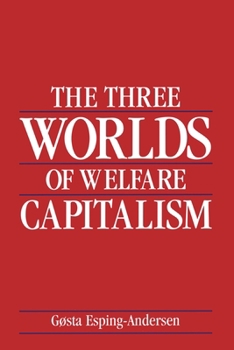The Three Worlds of Welfare Capitalism
Select Format
Select Condition 
Book Overview
Few discussions in modern social science have occupied as much attention as the changing nature of welfare states in Western societies. G sta Esping-Andersen, one of the foremost contributors to... This description may be from another edition of this product.
Format:Paperback
Language:English
ISBN:0691028575
ISBN13:9780691028576
Release Date:January 1990
Publisher:Princeton University Press
Length:264 Pages
Weight:0.85 lbs.
Dimensions:0.6" x 5.9" x 9.0"
Customer Reviews
3 ratings
The Causal Factors of Welfare Regimes
Published by Thriftbooks.com User , 17 years ago
Esping-Anderson suggests that two questions drive the debate regarding the welfare state. On one hand, authors like T.H. Marshall seek to examine the interaction of class and social welfare, while Esping-Anderson seeks to explain "the causal forces behind welfare-state development." In brief, the author suggests that three independent variables lead to specific welfare regimes: the nature of class mobilization, class-political coalition structures, and the historical legacy of regime institutionalization (29-31). The nature of class mobilization is important in that the way classes mobilize lends to the amount of power it can wield in pursing in its goals. Likewise, the type of class-political coalition structures assist in shaping the political will of various classes in that the coalitions help shape the political capital of various groups. Finally, the historical legacy of regimes is important in that it establishes the strength of weakness of class structures. The neoliberal welfare regime argues that a free market will abolish class and inequality, while state intervention only strengthens issues of class. The neoliberal model argues that democracy and universal suffrage "would be likely to politicize the distributional struggle, pervert the market, and fuel inefficiencies" (10). In reality, however, the neoliberal regime, through the capitalist system, tends to commodify labor to such an extent that people were unable to survive outside of the market. "Stripping society of the institutional layers that guaranteed social reproduction outside the labor contract meant the people were decommodified" (21). This leads to a difficulty in class mobilization as workers are now nothing more than a commodity to be traded between industries. As such, they are unlikely to gain the political power to translate "mobilized power into desired policies and reforms" (16). Because the neoliberal regime is so reliant on market forces, the state will not intervene unless the familial or market institutions fail. Esping-Anderson refers to this structure as a residual or welfare state. Such a state is characterized by means-tested social assistance. This often punishes and stigmatizes recipients of social welfare and ultimately creates a system of class stratification, particularly between the middle class who relies on market social insurance and the poor who are reliant on state-sponsored social insurance programs (23). Generally, the benefits offered by the neoliberal regime are quite small, as social welfare is seen as a cause of poverty and unemployment, and may lead to laziness and "moral corruption" (42). The conservative model disagreed with the idea of laisez-faire economic policies. Esping-Anderson suggests that the conservative ideal "was the perpetuation of patriarchy and absolutism as the best legal, political, and social shell for capitalism without class struggle" (10). The conservative paradigm sees a more authoritarian state as bet
essential reading
Published by Thriftbooks.com User , 23 years ago
This book blew me away when I read it. In fact, I read it again as soon as I finished it. This book is thoroughly documented to support the author's point. Whereas John Stephens focused more on total spending on welfare state programs, Esping-Andersen pointed to the crucial role that ideology plays in the structure of the welfare state. The structure of the programs often being more important than the total amount of money spent. Anyway, I don't need to recount the details of his argument. This book was a paradigm shifting, enlightening experience. I understand the world better because of this book. I think you will too.
Esping-Andersen Thinks Big Thoughts
Published by Thriftbooks.com User , 25 years ago
As a policy analysis grad-student, I couldn`t help but like this book. In a field where so many authors stick slavishly to what they can PROVE empirically, Esping-Andersen dares to ask big questions and think big thoughts. Interpreting the welfare state from a nineteenth centuryesque political economy perspective, he provides real insight, and defends his Marxist-inspired interpretation with flair and not a little bit of style. Not only that, but his exposition is clear and (dare I say?) kind of fun to read. If you want to understand why all rich western societies spend a BIG chunk of GDP on the welfare state, this is a great place to start





